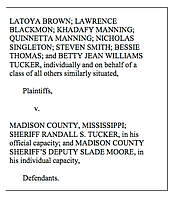Quinnetta Manning and her husband, Khadafy, were one two of 10 plaintiffs in a federal lawsuit the ACLU of Mississippi brought against Madison County and Sheriff Randall Tucker for “racially discriminatory policing tactics.” File Photo by Imani Khayyam.
The Madison County Sheriff’s Department engaged in unconstitutional, racially discriminatory policing practices that disproportionately targeted black residents, a Southern District of Mississippi judge ruled last week. Judge Carlton Reeves issued a consent decree, one of the first in Mississippi, to confront the issue of racist policing in the state by demanding new policies and reforms.
The decision stems from a 86-page lawsuit, Brown et. al v. Madison County, which Simpson Thatcher & Bartlett LLP, the American Civil Liberties Union and the ACLU of Mississippi filed in 2017 on behalf of 10 plaintiffs. The lawsuit accused the Madison County Sheriff’s Department of having “longstanding policy of stopping and searching Madison County’s Black citizens on the basis of their race, in violation of the Equal Protection Clause of the Fourteenth Amendment to the United States Constitution.”
Under the consent decree, the Madison County Sheriff’s Department must reform its checkpoint and pedestrian stop program and retrain its deputies. The sheriff must also collect and report data on its pedestrian stop and checkpoint programs to a Community Oversight Board and the attorneys who represented the plaintiffs in the lawsuit.
Madison County Officer Called Plaintiff ‘Mr. Cripple’
Joshua Tom, executive director of the ACLU of Mississippi, lauded the court’ decision in a statement. “The Court’s order today affirms the simple but fundamental proposition, that in America police must treat everyone the same regardless of race,” he said. “The ACLU of Mississippi looks forward to playing its role in ensuring that MCSD adheres to the terms of the agreement.”
“I think in Mississippi this is something hopefully that we can build upon and take over to other areas. We certainly get complaints from other parts of the state about law-enforcement practices, including perceived and alleged racial profiling,” Tom told the Jackson Free Press in a phone interview today. The consent decree sends a message that law enforcement agencies engaging in discriminatory practices will face repercussions, he added.
Key to the plaintiffs’ complaints are the sheriff’s placement of roadblocks and a pedestrian stop program in largely black neighborhoods. Although the population of Madison County is 57% white and 38% black, 77% of the people arrested in the county between 2012 and 2017 were black, evidence presented in the lawsuit showed. More than three quarters of arrests were made at roadblocks. Black drivers also accounted for 74% of traffic stop arrests. At the time that the lawsuit was filed, 12 of MCSD’s 71 officers were black.
The lawsuit also details a culture of excessive force among MCSD and the violation of black citizens’ constitutional rights through forced entry into their homes. Such was the experience of plaintiffs Lawrence Blackmon, Khadafy Manning and Quinetta Manning. In 2016, deputies from MCSD approached the Mannings at the door of their Canton apartment, demanding witness statements regarding a burglary in the area and threatening to jail the couple if they did not write them. Police then forced their way into the Mannings’ home without a warrant.
After Mr. Manning, who is disabled, advised his wife that she did not need to write a statement, a deputy choked him while calling him “Mr. Cripple.” The deputy then dragged him to a squad car, court documents show, where he was beaten until he wrote a statement.
‘A Necessary Step in Returning Humanity’
Black residents of Madison County have long protested the Madison County sheriff’s treatment of black citizens. In 2006, Canton residents gathered 664 signatures and petitioned the Madison County Board of Supervisors to end the roadblocks and racial profiling, the lawsuit pointed out. Sheriff Toby Towbridge did not meet with concerned citizens even after the former police chiefs of Ridgeland and Canton testified before the Mississippi Legislature in 2009 on the prevalence of racial profiling among law enforcement there.
JFP Reporting on Police Shootings and Excessive Use of Force
An archive of impactful journalism on the problems with policing in Mississippi
The consent decree comes amid recent efforts in Mississippi to hold law-enforcement agencies accountable. In 2015, the U.S. Department of Justice issued a consent decree against the Meridian Police Department for arresting children in schools. More recently, the Southern Poverty Law Center reached a settlement with the Hancock County Sheriff’s Department over the racial profiling of potential immigrants.
In Jackson, this newspaper’s reporting and editorials led to nearly a year of public meetings about whether to release names of Jackson police officers involved in shootings, with Mayor Chokwe Lumumba eventually releasing details of the incidents to the Jackson Free Press in January 2019.
“I know that every American citizen has rights, but the Madison County sheriffs treated us as though we didn’t and made us feel less than American,” plaintiff Quinetta Manning said about Judge Reeves’ recent ruling. “I believe that this settlement agreement is not only a necessary step in reforming MCSD but a necessary step in returning humanity to the black residents of Madison County.”
Follow City Reporter Seyma Bayram on Twitter @SeymaBayram0. Send tips to [email protected].
More stories by this author
- City Announces Robinson Road Repaving Project; Stay-At-Home Order Still in Effect
- City of Jackson Sues Canadian National Railway Over Blocked Railroad Underpass
- Mayor Lumumba Revises, Extends Jackson Stay-at-Home Order
- Mississippi Justice Institute Sues Mayor Lumumba for Open-Carry Order
- Jackson Attorney with COVID: ‘A False Sense of Protection Here’




